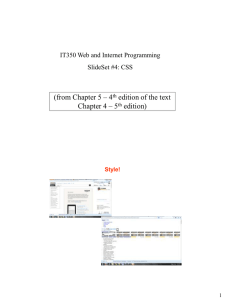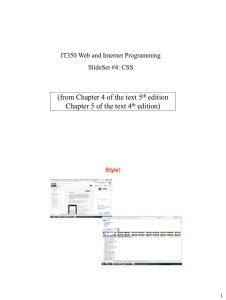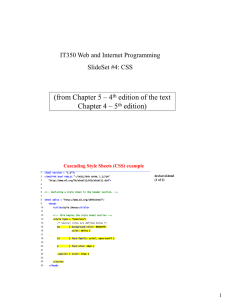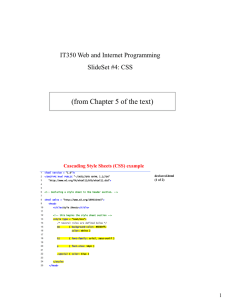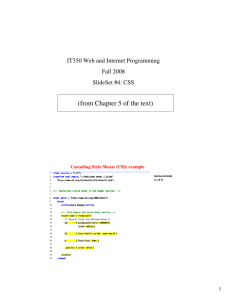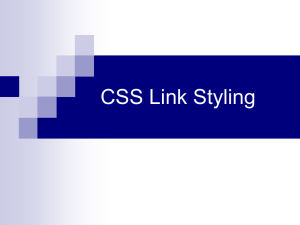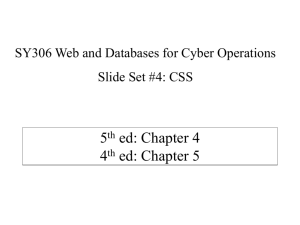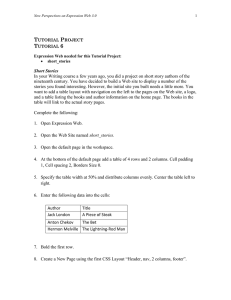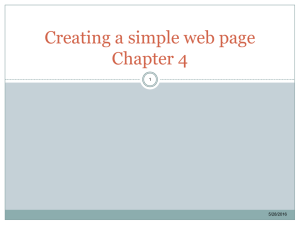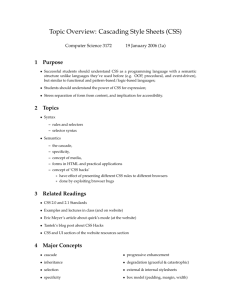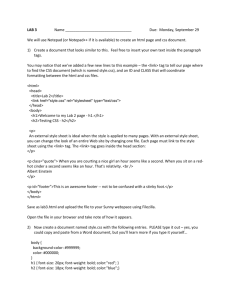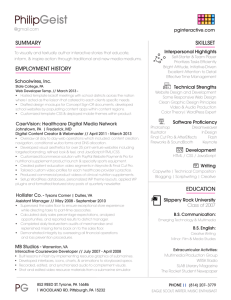(from Chapter 6 of the text) IT350 Web and Internet Programming
advertisement
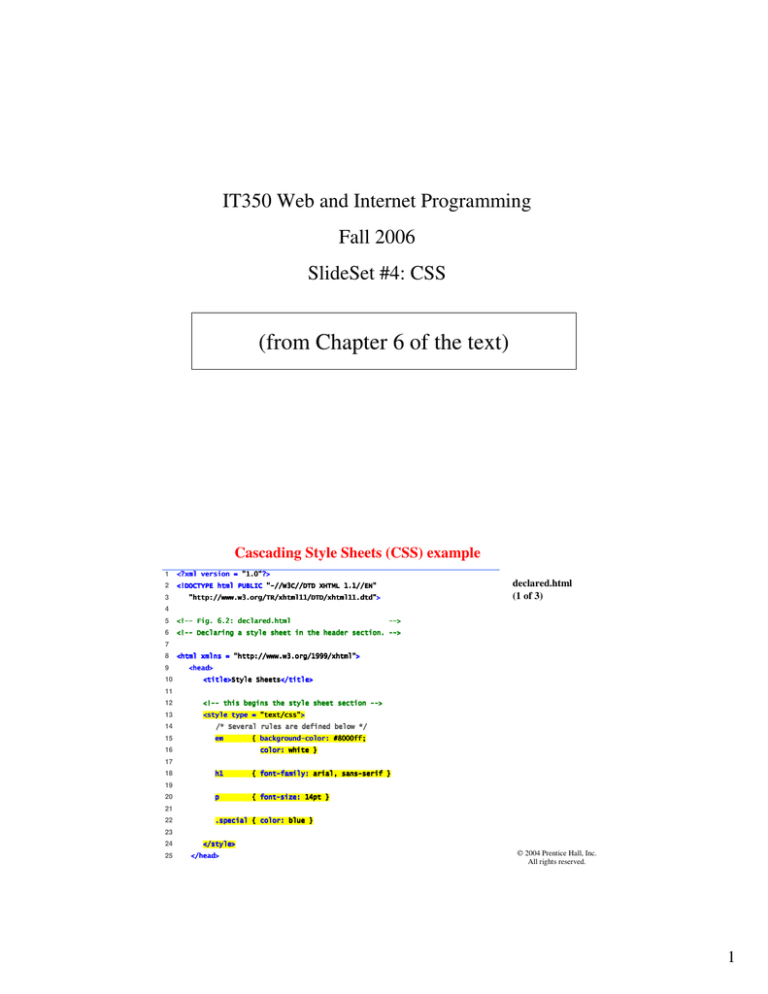
IT350 Web and Internet Programming
Fall 2006
SlideSet #4: CSS
(from Chapter 6 of the text)
Cascading Style Sheets (CSS) example
1
2
!
3
*+##,,, ,%
"##$% ##
-# .#
&' (
#
declared.html
(1 of 3)
## )
#
/ /
4
5
"" 0 -
6
""
1 2+ / 3 4
3 4
- 4
/
""
5
4/
4
/
3
""
7
8
*+##,,, ,%
9
-# 666#
4/
10
7 5
7
#
11
12
""
13
5
14
#9 7
8 -
5
5*
15
4
:
4
< 843=-
16
3
""
#3
3
/ ;
/"
"3
: /
+ ,
/ 8
, 9#
+ >?
;;@
;;
@
A
17
18
< ;
";4
< ;
"
5+ 4
4 B
4
"
; A
19
20
*
C +
D*
A
21
22
* 3 4
< 3
+ 8 :
A
23
24
25
#
#
4/
5
2004 Prentice Hall, Inc.
All rights reserved.
1
Key Questions
I.
Where can we specify style?
II.
How to “select” what parts of a page the style
applies to?
III. How can we specify specific style values?
I.
3 Locations for Style
1.
Inline
<p style = “font-size: 20pt” > … </p>
2.
Embedded style sheet (in <head>)
<head> … <style type=“text/css” >
p { font-size: 20 pt}
</style>
3.
External style sheet
<head> … <link rel=“stylesheet” type=“text/css” href=“styles.css” />
2
II.
CSS Selectors: automatically applied
<style type = "text/css">
p
{ font-size: 20pt}
h1, h2
{ font-size: 30pt}
li em
{ color: red;
font-weight: bold }
a:hover
{ text-decoration: underline;
color: red; }
</style>
II.
CSS Selectors: manually applied
<head> …<style type = "text/css">
a.nodec
{ text-decoration: none }
.crazy
{ font-size: 40pt; color: red }
#fineprint { font-size:8pt }
</style> </head>
<body> …
<a class=“nodec” href=“links.html”> …
<h1 class=“crazy”> …
<div id=“fineprint”> …
3
III.
What styles can I apply?
• font-family, font-size, font-style, fontweight
• text-decoration (line-through, overline,
underline, none)
• list-style-type (disc, square, circle, url)
• color, background-color
• text-align (left, center, right, justify)
• float (left, right, none)
• border-style, border-width, margin, padding
– margin-left, margin-right, etc.
• background-image
Many more…
III.
Examples of property values/units
Predefined – xx-small, x-small, small,
smaller, medium, large, x-large,
xx-large
40% (of current size or screen size)
2em (height of M)
3ex (height of x)
10px
12pt = 1 pc
23in
17cm
92mm
4
III.
Color
“color: yellow”
black, white, red, blue, …
“color: rgb(255, 255, 0)”
“color: #FFFF00”
“Web-safe colors”?
Only use hex values:
Exercise #1: Write an embedded stylesheet that will…
1. Make every <h1> and <h2> section have 20pt
size text
2. Put lines above links instead of under them
3. Define a rule “italic” that will italicize text
5
Exercise #2: Write an external stylesheet that will…
1. Using some relative size, make all <h3> text
twice as large as <h4> text
2. Make normal paragraphs that are nested inside a
table appear in bold.
Exercise #3: Where’s the bug?
/* styles.css */
td
{background-color: green; color: white}
th
{background-color: green; color: red}
a
{font-weight: bold; text-decoration: none}
table
{margin-left: 5em, border-style: groove,
border-width: thick}
div
{border-style: inset; border-width: thick}
.crazy
{color: yellow; font-weight:700}
.mild
{color: gray; text-decoration: underline}
6
Exercise #4
• Write XHTML, with inline CSS, to re-create this:
W3C CSS Validation Service
Fig. 6.7
CSS validation results. (Courtesy of World Wide Web Consortium (W3C).)
http://jigsaw.w3.org/css-validator
7
div and span
<p> A very <span class=“verybold”>important
</span> announcement follows… </p>
<div class=“links”>
<p> …
<p> …
<p> …
</div>
Centering Secrets
• Stylesheet:
.tcenter {text-align: center}
.dcenter {margin-left: auto;
margin-right: auto;
text-align: center}
• Usage:
<h1 class=“tcenter”>
<div class=“dcenter”>
<table> …</table>
<img> … </img>
</div>
8
